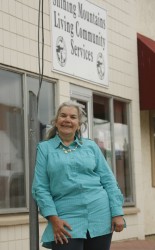Article Origin
Volume
Issue
Year
Rates of HIV infection in Aboriginal people are rising and Raye St. Denys wants that to change.
St. Denys, the executive director of Shining Mountains Living Community Services in Red Deer, Alta., an Aboriginal AIDS service organization, has elicited the help of Red Deer College’s Health Research Collaborative, a research partnership between Red Deer College and Alberta Health Services, to develop culturally-sensitive materials for Aboriginal front-line staff and people working with Aboriginals.
And according to St. Denys, developing material for Aboriginal front-line workers to address issues like HIV and safe sex will help fight the rising rates of infection.
“Our HIV rates are rising because of a lack of cultural competency in mainstream agencies, and a lack of skills in our agencies to address these challenges,” she said.
St. Denys first approached the college in 2009 to find out if it could support developing a strategy to address the cultural shortfalls. That’s when she met Scott Oddie, the chair of Rural Health Research at Red Deer College and director of the Health Research Collaborative. According to Oddie there has been no shortage of academic research conducted into Aboriginal people and HIV in Canada. Yet little of it has appeared to be of much benefit in solving the rising infection rates.
“There are five decades of research on HIV done in universities and academic institutes and there are as many decades of research done on Aboriginals, but infection rates have continued to rise,” Oddie said.
Over the last year, with guidance and support from Oddie and the college, St. Denys has been putting together a toolkit for Aboriginal front-line staff working with Métis and Aboriginal women around HIV. The kit is called Messengers and it provides ways of talking in a culturally sensitive manner about safe sexual habits and avoiding infection.
“This is a tool that was developed for Aboriginal staff to be able to address the needs of their clientele and improve their skills so they could talk about it with more ease,” St. Denys said.
But St. Denys says that the most important part of the process is that the research into Messengers wasn’t developed inside the halls of a university but by the same people it is going to support.
“This is a program developed by Aboriginals for Aboriginals,” St. Denys said.
Oddie said that such a mentality is important in creating a sense of ownership into research that can make a difference.
“Aboriginals have to collect that information and they had to own it themselves so they can go back to their community and develop strategies to address these problems,” Oddie said.
Speaking with Aboriginal focus groups across western Canada, St. Denys traveled as far as Cumberland House, Saskatchewan (a journey of more than 2,000 kilometres round-trip) to gain perspectives that helped inform her research.
But it was also her work with the local college that provided guidance and support to the research process.
“The relationship we’re developing with the college is one we can use as a template for other Aboriginal communities. We, in many ways, are raising the bar for partnerships between Aboriginal agencies, communities, and colleges and universities,” she said.
Oddie said that health regions face challenges in trying to provide appropriate services to Aboriginal people. By working with St. Denys, they’ve been able to identify ways to improve local health services.
“We now know the general population has some misperceptions about Aboriginal culture that we thought they didn’t have,” Oddie said.
St. Denys said that misperceptions about accessing health services can be just as challenging to overcome.
“Mainstream aids service organizations try really hard. But if they were providing culturally safe, appropriate services, Aboriginal numbers around HIV wouldn’t be climbing while mainstream numbers are declining,” St. Denys said.
Statistics Canada has documented that rates of HIV infection for Aboriginal people have increased over the last few years and that Aboriginal HIV infection rates typically occur at younger ages than non-Aboriginal people.
St. Denys hopes her research will reverse this trend and is grateful that her partnership with Red Deer College has enabled her to produce Messengers.
“We were going to be doing research and so without their academic support this project would never have happened. The college has done a huge service in upgrading our technology skills and has supported us in growing as an Aboriginal community agency,” St. Denys said.
At the end of the day, St. Denys hopes that Messengers will make a difference.
Messengers wasn’t the only product of the partnership between Shining Mountains and the college. Another study called ‘Voices from the Fire’ is gathering information about what provides resiliency in Aboriginal people.
For more information regarding Messengers (which is available in French and English), contact St. Denys at Shining Mountains Living Community Resource Centre at (403) 346-9794 or elk@telusplanet.net.
- 3167 views

